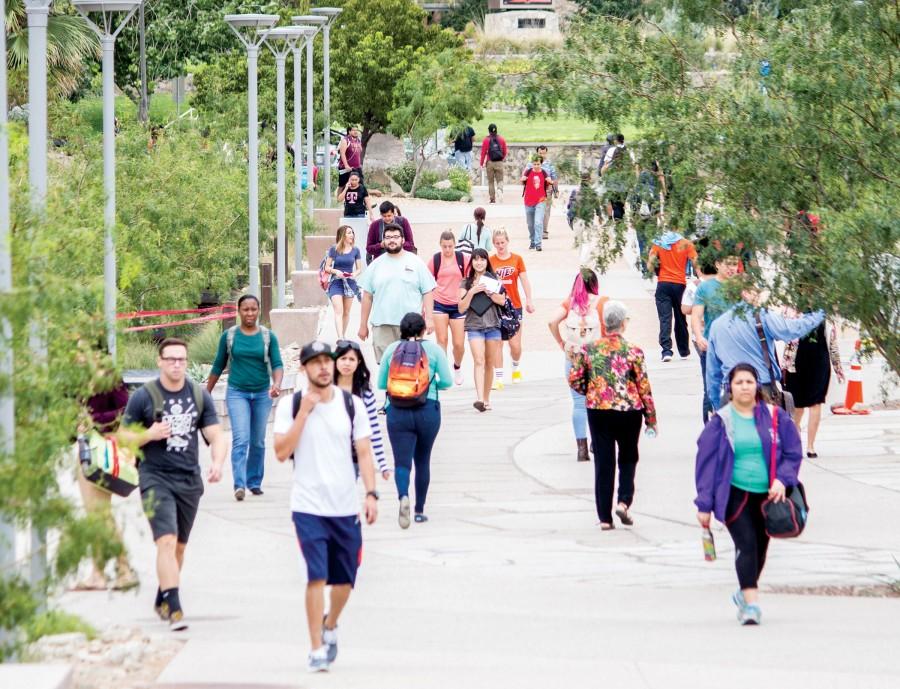United States universities must go through an accreditation process every 10 years to be recognized as a degree-granting higher education institution.
The Southern Association of Colleges and Schools Commission on Colleges, SACSCOC, is in charge of evaluating institutions in the southern states to make sure they provide services worthy of a higher education institution. “Every university in the country has to go through this in order to be able to grant degrees, but, it’s also an opportunity for us,” said David Ruiter, associate provost. “It gives us the opportunity to think about how we’re going to do even better in the 10 years that are coming up.”
UTEP was one of the many universities to undergo the process this year. During the process, SACSCOC evaluates institutions on integrity, qualifications of faculty and staff, mission fulfillment, curriculum, academic support and fiscal practices. UTEP received outstanding feedback from SACSCOC on what it has done in the past decade and what it plans to do in the next one.
The reaffirmation of accreditation portion of the process consists of university officials showing SACSCOC that UTEP has all of the resources and services in place worthy of an accredited university. Toni Blum, assistant provost and chair of the reaffirmation steering committee, compiled paperwork and reports showing the university meets all requirements. After the paperwork is submitted and reviewed, a site visit occurs where a special committee makes sure everything that was on paper is really taking place on campus.
“They want to meet with students, they want to meet with staff, they want to meet with faculty, they want to meet with administrators,” Blum said. “They want to really get a sense of, ‘Is UTEP really doing all of the things it says its doing?’” The site visit, which lasts about two-and-a-half days, culminates with a set of recommendations from the visiting committee that the university must address in order to be reaccredited.
The university has time to make changes before the final accreditation vote in December. “The thing that you want for being reaffirmed is to be affirmed with no recommendations,” Blum said.
After meeting with faculty, staff, administrators and students, the visiting committee came to the conclusion that UTEP met all requirements and needed no recommendations—something that, according to SACSCOC, does not happen often. Among the things that stood out to the committee were the impact of UTEP’s mission and its use of data in improving the services it provides.
“One thing that I think they were blown away by was the way in which the mission of UTEP is part of everything we do,” Blum said. “That was something that really was refreshing and surprising to them. That no matter who they spoke to, people were talking about access and excellence.” The second part of the reaffirmation for accreditation process deals with the future. Every university develops a plan for the next 10 years called a Quality Enhancement Plan.
UTEP’s plans for the next 10 years also received great feedback. “This new plan is exciting for all of us because we’re at a point where we are truly being able to see the incredible assets that our student population brings to us,” Ruiter said. “After all these years of experience at the university and in the city, we have an even clearer vision about how we can support our students forward.” UTEP’s QEP focuses on the idea of providing UTEP students with all the resources necessary to succeed once they leave the university. Highlighted in the plan are efforts to engage students with what the plan calls high-impact practices.
Internships, student employment, study abroad and service learning are all identified as high-impact practices. By talking to successful alumni, the university was able to identify these opportunities as vital to success in life after graduation. Blum said the QEP was the main focus of the visiting team during the site visit.
The excitement about it was obvious when the lead evaluator almost broke down in tears talking about UTEP’s plans for the future.
“I think having met with some students was really what the powerful motivator was for him,” Blum said. “Realizing how transformational UTEP has been in their lives and also, really, and I think this is a kind of important piece of the puzzle, how transformational students have been for UTEP.”
Luis Gonzalez may be reached at [email protected]










